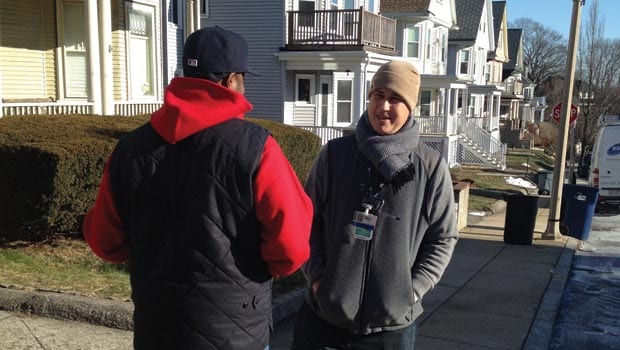Partners HealthCare Hospitals are working to improve men’s health in our communities
A Special Advertorial Section

The founding hospitals of Partners HealthCare are addressing Men’s health in innovative ways. Here are just two examples: The Brigham and Women’s Hospital is addressing violence as a disease — one that disproportionately affects low income and vulnerable people, and Massachusetts General Hospital is providing hundreds of young men opportunities to thrive through its Leadership Academy.
Brigham and Women’s Hospital is addressing violence as a disease
Youth violence in Boston is a growing public health issue that requires immediate and ongoing attention from various stakeholders, including major health institutions.
Data shows homicide is the leading cause of death for young African American men and the second leading cause of death for young Latino men.
Since the Boston Marathon bombings on April 15th, six people have been shot and killed, and over 44 gun related injuries have occurred in the communities of Roxbury, Dorchester and Mattapan.
Brigham and Women’s Hospital (BWH) is treating violence like a disease, using hospital resources to save lives and shift the thinking about this problem. The vision: Provide services that mitigate negative economic and social consequences of violence for victims, their families and communities with programs that are integral pieces to one strategic puzzle.
One program, the Violence Prevention Program (VPP), works to prevent future violence by increasing protective factors — building resiliency, creating safe spaces and supporting reflection on trauma. A second program, the Violence Recovery Program (VRP), provides intensive intervention and follow-up services after violence has occurred. The two work hand-in-hand to provide a comprehensive trauma response to young people most impacted by violence that will lead to safer, more connected futures.

High School students participate in the Accelerated College Experience program at Massachusetts General Hospital.
The VRP works with youth treated at BWH as a result of penetrating injuries. The Recovery Specialist connects with patients and families to provide support while they heal, guidance navigating the health care system and a safety plan for when they leave the hospital. For the next year and with community partners, the Recovery Specialist follows and mentors patients, helping them to sustain their safety plan.
The VPP is an innovative approach to bridge the gaps between partner violence, community violence and sexual assault. It is rooted in a health equity approach and addresses the impact of exposure to multiple forms of violence and trauma through a racial and gender justice lens.
These strategies have made an impact on both the patients and the hospital community. According to Dr. Jonathan Gates, Medical Director, Trauma Services at BWH, “This program is transformational. It changes the way we work on these cases.”
Massachusetts General Hospital is developing healthy futures for young men of color through its Leadership Academy
Research shows that educational attainment is highly correlated with economic status and is a strong predictor of health status. Every year for the past two decades, Mass General has offered educational and employment opportunities in health and science to hundreds of Boston youth to inspire an interest in health careers. MGH is committed to expanding the horizons of these young people as a long-term health improvement strategy as well as a workforce development strategy.
This year, the MGH Center for Community Health Improvement (CCHI) and MGH Youth Programs will provide nearly 500 youth from Boston, Chelsea and Revere with academic, life and career skills that expand and enhance their educational and career options through activities related to science, technology, engineering and math (STEM). These activities allow young people to forge relationship with caring health professionals while building skills through experiences related to STEM subjects and careers, life sciences and health and wellness.
Many of the youth served by MGH Youth Programs are young men of color, and in today’s society, they face challenges every day. Recognizing these challenges, the MGH Youth Programs recently sponsored a two-day Leaders Academy for 17 male high school student program participants. The program, created by Accelerated College Experience (ACE), was designed to develop the students’ skills to make smart choices, build self-esteem and prepare for college. During the seminar, the young men defined and reviewed the skills and traits of a good leader. They discussed the powerful influence that they, as leaders, can bring to make change in their respective communities. The young men also linked their educational pursuits to their career aspirations, and what it takes to get there.
Christy Egun, the Director of Boston Partnerships for CCHI at MGH, said Leaders Academy draws out the leadership potential in each young man so that he and everyone around him recognize these outstanding qualities. “Our goal is to have these bright young men — our future doctors and scientists and engineers — understand their strengths and seek the paths that lead to very bright and healthy futures for each of them and for their communities,” Egun said.






